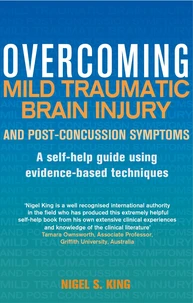An Introduction to Coping with Brain Injury
Par :Formats :
Disponible dans votre compte client Decitre ou Furet du Nord dès validation de votre commande. Le format ePub protégé est :
- Compatible avec une lecture sur My Vivlio (smartphone, tablette, ordinateur)
- Compatible avec une lecture sur liseuses Vivlio
- Pour les liseuses autres que Vivlio, vous devez utiliser le logiciel Adobe Digital Edition. Non compatible avec la lecture sur les liseuses Kindle, Remarkable et Sony
- Non compatible avec un achat hors France métropolitaine
 , qui est-ce ?
, qui est-ce ?Notre partenaire de plateforme de lecture numérique où vous retrouverez l'ensemble de vos ebooks gratuitement
Pour en savoir plus sur nos ebooks, consultez notre aide en ligne ici
- FormatePub
- ISBN978-1-4721-4761-5
- EAN9781472147615
- Date de parution05/04/2023
- Protection num.Adobe DRM
- Infos supplémentairesepub
- ÉditeurRobinson
Résumé
Just the facts for coping with the after-effects of a brain injuryAcquired Brain Injury (ABI) usually refers to people who have suffered a head injury or stroke but also includes those who have had brain tumours, an anoxic injury (where the brain has been starved of oxygen) or brain illnesses like encephalitis and meningitis. After an ABI, the brain undergoes a very slow healing process before improvements slow down and eventually plateau.
This is different to other forms of brain conditions where the journey is more of a deteriorating one over time. ABI is commonly called 'a hidden disability' as it can easily be missed or misunderstood by others. Also it can significantly affect those close to the person and therefore it is frequently called 'a family affair' too. As the issues are often hidden, complicated and affect patients and families alike, this book can act as a roadmap to help you and your loved ones navigate through the complex and often unexpected challenges that can arise following a brain injury, using:- Cognitive rehabilitation approaches to understand and manage changes in our thinking abilities- Cognitive behavioural approaches to address ways in which our thoughts, feelings, actions and physical reactions relate to each other
This is different to other forms of brain conditions where the journey is more of a deteriorating one over time. ABI is commonly called 'a hidden disability' as it can easily be missed or misunderstood by others. Also it can significantly affect those close to the person and therefore it is frequently called 'a family affair' too. As the issues are often hidden, complicated and affect patients and families alike, this book can act as a roadmap to help you and your loved ones navigate through the complex and often unexpected challenges that can arise following a brain injury, using:- Cognitive rehabilitation approaches to understand and manage changes in our thinking abilities- Cognitive behavioural approaches to address ways in which our thoughts, feelings, actions and physical reactions relate to each other
Just the facts for coping with the after-effects of a brain injuryAcquired Brain Injury (ABI) usually refers to people who have suffered a head injury or stroke but also includes those who have had brain tumours, an anoxic injury (where the brain has been starved of oxygen) or brain illnesses like encephalitis and meningitis. After an ABI, the brain undergoes a very slow healing process before improvements slow down and eventually plateau.
This is different to other forms of brain conditions where the journey is more of a deteriorating one over time. ABI is commonly called 'a hidden disability' as it can easily be missed or misunderstood by others. Also it can significantly affect those close to the person and therefore it is frequently called 'a family affair' too. As the issues are often hidden, complicated and affect patients and families alike, this book can act as a roadmap to help you and your loved ones navigate through the complex and often unexpected challenges that can arise following a brain injury, using:- Cognitive rehabilitation approaches to understand and manage changes in our thinking abilities- Cognitive behavioural approaches to address ways in which our thoughts, feelings, actions and physical reactions relate to each other
This is different to other forms of brain conditions where the journey is more of a deteriorating one over time. ABI is commonly called 'a hidden disability' as it can easily be missed or misunderstood by others. Also it can significantly affect those close to the person and therefore it is frequently called 'a family affair' too. As the issues are often hidden, complicated and affect patients and families alike, this book can act as a roadmap to help you and your loved ones navigate through the complex and often unexpected challenges that can arise following a brain injury, using:- Cognitive rehabilitation approaches to understand and manage changes in our thinking abilities- Cognitive behavioural approaches to address ways in which our thoughts, feelings, actions and physical reactions relate to each other




